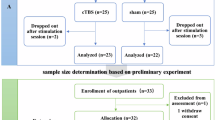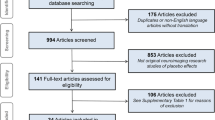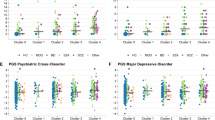Abstract
Impulsive aggressive behavior is common in psychiatric disorders and accounts for significant morbidity and mortality. However, little systematic treatment data exist from placebo-controlled trials for this symptom domain. This was a multicenter, randomized, double-blind, placebo-controlled study in which outpatients with a score of ⩾15 on the Aggression scale of the Overt Aggression Scale-Modified (OAS-M) and who fulfilled DSM-IV criteria for Cluster B personality disorder (n=96), intermittent explosive disorder (n=116), or post-traumatic stress disorder (n=34) were randomized to divalproex sodium or placebo for 12 weeks duration. Based on average OAS-M Aggression scores over the last 4 weeks of treatment, a treatment effect was not observed in the intent-to-treat data set (combined across the three psychiatric disorders), but was observed in both intent-to-treat and evaluable data sets for patients with Cluster B personality disorders. In the Cluster B evaluable data set, statistically significant treatment differences favoring divalproex were also observed for component items of the OAS-M Aggression score, including verbal assault and assault against objects, as well as OAS-M Irritability score, and Clinical Global Impression (CGI)-Severity at multiple time points throughout the study. No treatment group difference was noted for overall premature discontinuation rate; however, across psychiatric diagnoses, 21 (17%) patients in the divalproex group prematurely discontinued because of an adverse event, as compared to 4 (3%) patients in the placebo group (p<0.001). While a treatment effect was not observed when all diagnostic groups were combined, in a large subgroup of patients with Cluster B disorders, divalproex was superior to placebo in the treatment of impulsive aggression, irritability, and global severity.
Similar content being viewed by others
Log in or create a free account to read this content
Gain free access to this article, as well as selected content from this journal and more on nature.com
or
References
Allain H, Dautzenberg PH, Maurer K, Schuck S, Bonhomme D, Gerard D (2000). Double blind study of tiapride versus haloperidol and placebo in agitation and aggressiveness in elderly patients with cognitive impairment. Psychopharmacology 148: 361–366.
Barratt ES, Stanford MS, Felthous AR, Kent TA (1997). The effects of phenytoin on impulsive and premeditated aggression: a controlled study. J Clin Psychopharmacol 17: 341–349.
Campbell M, Adams PB, Small AM, Kafantaris V, Silva RR, Shell J et al (1995). Lithium in hospitalized aggressive children with conduct disorder: a double-blind and placebo-controlled study. Am J Acad Child Adolescence Psychiatry 34: 445–453.
Chengappa KN, Ebeling T, Kang JS, Levine J, Parepally H (1999). Clozapine reduces sever self-mutilation an aggression in psychotic patients with borderline personality disorder. J Clin Psychiatry 60: 477–484.
Coccaro EF (1998a). Impulsive aggression: a behavior in search of clinical definition. Harv Res Psychiatry 5: 336–339.
Coccaro E, Gabriel S, Siever L (1990). Buspirone challenge: preliminary evidence for a role of 5HT1A receptor function in impulsive aggressive behavior in humans. Psychopharmacol Bull 26: 393–405.
Coccaro EF, Harvey PH, Kupshaw-Lawrence E, Herbert JL, Bernstein DP (1991). Development of neuropharmacologically based behavioral assessments of impulsive aggressive behavior. J Neuropsychiatry Clin Neurosci 3(Suppl): 44–51.
Coccaro EF, Kavoussi RJ (1997). Fluoxetine and impulsive aggressive behavior in personality-disordered subjects. Arch Gen Psychiatry 54: 1081–1088.
Coccaro EF, Kavoussi RJ, Berman ME, Lish JD (1998b). Intermittent explosive disorder revised: development, reliability, and validity of research criteria. Compr Psychiatry 39: 368–376.
Coccaro EF, Siever LJ, Kiar HM, Maurer G, Cochrane K, Cooper TB et al (1989). Serotonergic studies in patients with affective and personality disorders. Correlates with suicidal and impulsive aggressive behavior. Arch Gen Psychiatry 46: 587–599.
Cold JW (1998). Axis II disorders and motivation for serious criminal behavior. In Skodal AE (ed). Psychopathology and Violent Crime. American Psychiatric Press: Washington, DC.
Cowdry RW, Gardner DL (1988). Pharmacotherapy of border-line personality disorder: alprazolam, carbamazepine, trifluoperazine, and tranylcypromine. Arch Gen Psychiatry 45: 111–119.
Donovan SJ, Stewart JW, Nunes EV, Quitkin FM, Parides M, Daniel W et al (2000). Divalproex treatment for youth with explosive temper and mood lability: a double-blind, placebo-controlled crossover design. Am J Psychiatry 157: 818–820.
Donavan SJ, Susser ES, Nunes EV, Stewart JW, Quitkin FM, Klein DF (1997). Divalproex treatment of disruptive adolescents: a report of 10 cases. J Clin Psychiatry 58: 12–15.
Eichelman B (1995). Animal and evolutionary models of impulsive aggression. In Hollander E, Stein DJ (eds). Impulsivity and Aggression. Wiley: Chichester, UK. pp 59–90.
Eichelman B, Elliottt GR, Barchas JD (1981). Biochemical, pharmacological, and genetic aspects of aggression. In: Hamburg DA, Trudeau MB (eds). Behavioral Aspects of Aggression. Alan R. Liss: New York. pp 51–84.
Endicott J, Tracy K, Burt D, Olson E, Coccaro EF (2002). A novel approach to assess inter-rater reliability in the use of the Overt Aggression Scale-Modified. Psychiatry Res 112: 153–159.
Fava M, Rosenbaum JF, Pava JA, McCarthy MK, Steingard RJ, Bouffides E (1993). Anger attacks in unipolar depression, Part 1: clinical correlates and response to fluoxetine treatment. Am J Psychiatry 150: 1158–1163.
Fesler FA (1991). Valproate in combat related posttraumatic stress disorder. J Clin Psychiatry 52: 361–363.
First MB, Spitzer RL, Williams JB (1994). Structured Clinical Interview for DSM-IV Axis II Personality Disorders (SCID-II, Version 2.0), Biometric Research, New York State Psychiatric Institute: New York, NY.
Frankenburg FR, Zanarini MC (2002). Divalproex sodium treatment of women with borderline personality disorder and bipolar II disorder: a double-blind, placebo controlled pilot study. J Clin Psychiatry 63: 442–446.
Giakas WJ, Seibyl JP, Mazure CM (1990). Valproate in the treatment of temper outbursts. J Clin Psychiatry 51: 525.
Guy W (1976). ECDEU Assessment Manual for Psychopharmacology, Publication No. ADM 76-336. US Department of Health, Education and Welfare: Rockville, MD.
Haas S, Vincent K, Holt J, Lippman S (1997). Divalproex: a possible treatment alternative for demented elderly aggressive patients. Ann Clin Psychiatry 9: 145–147.
Hollander E, Allen A, Lopez RP, Bienstock CA, Grossman R, Siever LJ et al (2001a). A preliminary double-blind, placebo-controlled trial of divalproex sodium in borderline personality disorder. J Clin Psychiatry 62: 199–203.
Hollander E, Evers M (2001b). New developments in impulsivity. Lancet 358: 949–950.
Hollander E, Posner N, Cherkasky S (2002). Neuropsychiatric aspects of aggression and impulse control disorders. In: Yudofsky SC, Hales RE (eds). American Psychiatric Press Textbook of Neuropsychiatry. American Psychiatric Press: Washington, DC. pp 579–596.
Hori A (1998). Pharmacotherapy for personality disorders. Psychiatry Clin Neurosci 52: 13–19.
Horne M, Lindley SE (1995). Divalproex sodium in the treatment of aggressive behavior and dysphoria in patients with organic brain syndrome. J Clin Psychiatry 56: 430–431.
Itil TM, Wadud A (1975). Treatment of human aggression with major tranquilizers, antidepressants, and newer psychotropic agents. J Nerv Ment Dis 160: 83–99.
Kavoussi RJ, Coccaro EF (1998). Divalproex sodium for impulsive-aggressive behavior in patients with personality disorder. J Clin Psychiatry 59: 676–680.
Khouzam H, Donnelly N (1997). Remission of self-mutilation in a patient with borderline personality disorder during risperidone therapy. J Nerv Mental Dis 185: 348–349.
Leventhal BL, Brodie HKH (1981). The pharmacology of violence. In: Hamburg DA, Trudeau MB (eds). Behavioral Aspects of Aggression. Alan R. Liss: New York. pp 85–106.
Links PS, Steiner M, Boiago I (1990). Lithium therapy for borderline patients: preliminary findings. J Clin Psychopharmacol 4: 173–181.
Malone RP, Delaney MA, Luebbert JF, Cater J, Campbell M (2000). A double-blind placebo-controlled study of lithium in hospitalized aggressive children and adolescents with conduct disorder. Arch Gen Psychiatry 57: 649–654.
Mann JJ, McBride PA, Anderson GM, Mieczkowski TA (1992). Platelet and whole blood serotonin content in depressed inpatients: correlations with acute and lifetime psychopathology. Biol Psychiatry 32: 243–257.
Moeller FG, Barratt ES, Dougherty DM, Schmitz JM, Swann AC (2001). Psychiatric aspects of impulsivity. Am J Psychiatry 158: 1783–1793.
Moyer KE (1968). Kinds of aggression and their physiological basis. Commun Behav Biol 2: 65–71.
New AS, Trestman RL, Mitropoulou V, Benishay DS, Coccaro E, Silverman J et al (1997). Serotonergic function and self-injurious behavior in personality disorder patients. Psychiatry Res 69: 17–26.
Pattison E, Kahan J (1983). The deliberate self-harm syndrome. Am J Psychiatry 140: 867–872.
Petty F, Davis LL, Nugent AL, Kramer GL, Teten A, Schmitt A et al (2002). Valproate therapy for chronic combat-induced posttraumatic stress disorder. J Clin Psychopharmacol 22: 100–101.
Reis DJ (1971). Brain monoamines in aggression and sleep. Clin Neurosurg 18: 471–502.
Salzman C, Wolfson AN, Schatzberg A, Looper J, Henke R, Albanese M et al (1995). Effect of fluoxetine on anger in symptomatic volunteers with borderline personality disorder. J Clin Psychopharmacol 15: 23–29.
Sheard M, Marini J, Bridges C, Wagner E (1976). The effect of lithium on impulsive aggressive behavior in man. Am J Psychiatry 133: 1409–1413.
Stein DJ, Simeon D, Frenkel M, Islam MN, Hollander E (1995a). An open-trial of valproate in borderline personality disorder. J Clin Psychiatry 56: 506–510.
Stein DJ, Towey J, Hollander E (1995b). The neuropsychiatry of impulsive aggression. In: Hollander E, Stein DJ (eds). Impulsivity and Aggression. Wiley: Chichester UK. pp 91–105.
Swann AC, Anderson J, Dougherty BM, Moeller FG (2001). Measurement of interepisode impulsivity in bipolar disorder: preliminary report. Psychiatr Res 101: 195–197.
Szymanski HV, Olympia J (1991). Divalproex in posttraumatic stress disorder. Am J Psychiatry 148: 1086–1087.
Tariot PN, Schneider LS, Mintzer JE, Cutler AJ, Cunningham MR et al (2001). Safety and tolerability of divalproex sodium in the treatment of signs and symptoms of mania in elderly patients with dementia: results of a double-blind, placebo-controlled trial. Curr Ther Res 62: 51–67.
Tupin JP, Smith DB, Clanon TL, Kim LI, Nugent A, Groupe A (1973). The long-term use of lithium in aggressive prisoners. Compr Psychiatry 14: 311–317.
Virkkunen M (1975). Reactive hypoglycemic tendency among habitually violent offenders. Nutr Rev 44(Suppl): 94–103.
Virkkunen M, Narvanen S (1987). Plasma insulin, tryptophan, and serotonin levels during the glucose tolerance test among habitually violent and impulsive offenders. Neuropsychobiology 17: 19–23.
Wilcox J (1995). Divalproex sodium as a treatment for borderline personality disorder. Ann Clin Psychiatry 7: 3–7.
Yudofsky SC, Silver JM, Jackson W, Endicott J, Williams D (1986). The overt aggression scale for the objective rating of verbal and physical aggression. Am J Psychiatry 143: 35–39.
Zanarini MC, Frankenburg FR (2001). Olanzapine treatment of female borderline personality disorder patients: a double-blind, placebo-controlled pilot study. J Clin Psychiatry 62: 849–854.
Acknowledgements
We thank the other investigators, as follows, for their enrollment of patients and participation in this study: Kathleen Brady, MD, Medical University of South Carolina, Charleston, SC; Lori Davis, MD, Tuscaloosa VAMC, Tuscaloosa, AL; James Ferguson, MD, Pharmacology Research Clinic, Salt Lake City, UT; Jeffrey S Kelsey, MD, Emory University, Atlanta, GA; Steven Lindley, MD, National Center for PTSD, Menlo Park, CA; Gopinath Mallya, MD, McLean Hospital, Belmont, MA; John Marshall, MD, Wisconsin Psychiatric Institute and Clinics, Madison, WI; Jeffrey A Mattes, MD, Psychopharm Research, Princeton, NJ; Gerard F Moeller, MD, University of Texas Health Science Center, Houston, TX; George Nurnberg, MD, University of New Mexico Health Sciences Center, Albuquerque, NM; Frederick Petty, MD, Dallas VAMC, Dallas, TX; Mark Rapaport, MD, University of California, La Jolla, CA; Rudolph Steven, DO, San Diego, CA; Christopher Reist, MD, Long Beach VAMC, Long Beach, CA; Carlos Zarate, MD, University of Massachusetts, Worcester, MA; and Mark Zimmerman, MD, Rhode Island Hospital, Providence, RI.
The DSMB members for this study were: Dennis Charney, MD, National Institute of Mental Health, Bethesda, MD; Judith Jones, MD, PhD, The Degge Group, Ltd, Arlington, VA; James Neaton, PhD, School of Public Health, University of Minnesota, Minneapolis, MN; Larry Siever, MD, Bronx VA Medical Center (116A), Bronx, NY; and Debbie Wentworth, School of Public Health, University of Minnesota, Minneapolis, MN.
Dr Hollander has received research grants from Abbott Laboratories, Bristol Myers Squibb, Eli Lilly and Company, Pfizer Laboratories, Solvay, and Wyeth-Ayerst. He has served as a consultant to and member of the Speakers Bureau of Abbott Laboratories, Solvay, and Wyeth-Ayerst.
Dr Swann has received grant support from Abbott Labo-ratories, Glaxo SmithKline, UCB Pharma, Bristol Myers Squibb, Eli Lilly, and Shire Laboratories. He has served as a consultant for Abbott Laboratories, Pfizer Laboratories, Shire Laboratories, UCB Pharma, Glaxo SmithKline, Novartis, Eli Lilly, and Bristol Myers Squibb. He has served on Speakers’ Bureaus for Abbott Laboratories, Janssen Pharmaceuticals, Novartis, Glaxo SmithKline, and Pfizer Laboratories.
Dr Coccaro is a consultant to Abbott Laboratories and to Eli Lilly Pharmaceuticals. He is a member of the Speakers Bureau for Abbott Laboratories, Eli Lilly Pharmaceuticals, Glaxo SmithKline, and Forest Pharmaceuticals and has received research grants from Abbott Laboratories and Eli Lilly Pharmaceuticals.
Dr McElroy is a consultant to Abbott Laboratories and is a member of the company's Speakers Bureau and Divalproex Advisory Board. She has also received research grants from Abbott Laboratories, and Eli Lilly and Company.
Dr Nemeroff reports the following: Grants/Research: Abbott Laboratories; AstraZeneca; Bristol-Myers-Squibb; Forest Laboratories; Janssen Pharmaceutica; Eli Lilly; GlaxoSmithKline; NARSAD; NIMH; Organon; Pfizer Pharmaceuticals; Pharmacia-Upjohn; Stanley Foundation/NAMI; and Wyeth-Ayerst.
Consultant: Abbott Laboratories; Acadia Pharmaceuticals; AstraZeneca; Bristol-Myers-Squibb; Cephalon Pharmaceuticals; Corcept; Cypress Biosciences; Forest Laboratories; GlaxoSmithKline; Janssen Pharmaceutica; Eli Lilly; Merck; Mindsense; Neurocrine Biosciences; Novartis; Organon; Otsuka; Pharmacia-Upjohn; Sanofi; Somerset; Vela Pharmaceuticals; and Wyeth-Ayerst.
Speakers Bureau: Abbott Laboratories; AstraZeneca; Bristol-Myers-Squibb; Eli Lilly; Forest Laboratories; GlaxoSmithKline; Janssen Pharmaceutica; Organon; Pfizer Pharmaceuticals; and Wyeth-Ayerst.
Stockholder: Corcept and applies only to Dr. Nemeroff Drs Tracy, Wozniak, and Sommerville are employees of Abbott Laboratories.
Author information
Authors and Affiliations
Corresponding author
Additional information
This study was supported by a grant from Abbott Laboratories, Abbott Park, IL. These data were presented in part at the 2002 Annual Meeting of the American Psychiatric Association, Philadelphia, PA, USA, May 18–23, 2002.
Rights and permissions
About this article
Cite this article
Hollander, E., Tracy, K., Swann, A. et al. Divalproex in the Treatment of Impulsive Aggression: Efficacy in Cluster B Personality Disorders. Neuropsychopharmacol 28, 1186–1197 (2003). https://doi.org/10.1038/sj.npp.1300153
Received:
Revised:
Accepted:
Published:
Issue date:
DOI: https://doi.org/10.1038/sj.npp.1300153
Keywords
This article is cited by
-
Higher trait neuroticism is associated with greater fatty acid amide hydrolase binding in borderline and antisocial personality disorders
Scientific Reports (2022)
-
Effectiveness and safety of intravenous valproate in agitation: a systematic review
Psychopharmacology (2022)
-
Mentalization for Offending Adult Males (MOAM): study protocol for a randomized controlled trial to evaluate mentalization-based treatment for antisocial personality disorder in male offenders on community probation
Trials (2020)
-
Zur Pharmakotherapie impulsiver Aggression bei antisozialen und psychopathischen Störungen
Forensische Psychiatrie, Psychologie, Kriminologie (2018)
-
Pharmakologische Therapieoptionen in der psychiatrischen Versorgung
DNP - Der Neurologe und Psychiater (2014)



